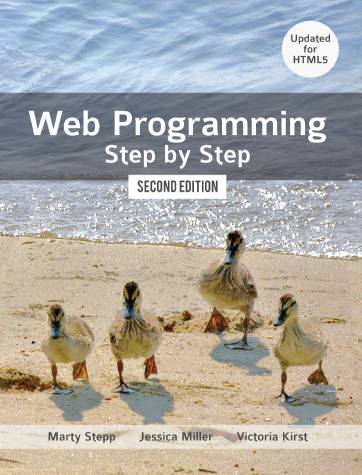Syllabus
CSSE 290 – Introduction to Web Programming
Spring 2012–2013 (a.k.a. 201330)
Prerequisites and Course Content
Prerequisites
The formal prerequisite (or corequisite) is:
CSSE 220 – Object-Oriented Software Development
or
CSSE 221 – Fundamentals of Software Development Honors.
I will not assume that students have prior knowledge of any of the course topics/tools, although you should be very comfortable with programming in general.
If you have learned more than one programming language, that should make it easier for you to learn multiple languages in this course.
The main things you should bring into this course include:
-
Above all, you need to bring a willingness to learn on your own. In this course you will mainly learn by doing things and by asking questions. Frequently
I will provide short introductions (or lectures) on the material that
I ask you to learn; however, much of the learning happens when you explore the textbook, the exercises, and the subject matter on which the exercises are based.
-
Enthusiasm, curiosity, perseverance, and a "can do" attitude.
-
Willingness to work cooperatively with other students (inside the classroom and out) to enhance the learning environment.
If you have more experience than the prerequisites imply, you should spend some in-class time helping other students.
-
Willingness to consistently devote enough time to the course.
-
Willingness to quickly learn the basics of several languages.
-
Commitment to keep up with the course and to ask questions when you do not understand something.
-
A strong comfort level with variables, assignment, if,
while and for loops, writing and calling
methods, formal and actual parameters, pass by value. By the midpoint of this course, you should
also be comfortable with creating objects and classes in some language. If you have previously taken 220 or 221, you should already have this background.
-
By the midpoint of this course, you should also be comfortable with defining and using classes (including inheritance), objects, methods, parameters, arrays, and exceptions.
If you have previously taken 220 or 221, you should already have this background.
Course Description
This course will introduce principles of and some tools
for web programming.
Topics will include (as many as time allows)
- Browser-server interaction via the HyperText Transfer Protocol (HTTP).
- Static web page creation using HyperText Markup Language (HTML5) and Cascading Style Sheets (CSS3).
- Programs that run on the server, using the PHP Hypertext Processing language.
- Applications that run in the client's browser, using JavaScript.
- Dynamically changing web pages using JavaScript event-handling and the Document Object Model (DOM).
- JavaScript extension libraries, such as JQuery or Prototype.
- Asynchronous communication between a web application and server using AJAX.
- Object Serialization using XML or JSON.
- Server-side database connections with mySQL.
- Cookies, authentication, security.
- Higher-level server-side tools.
That list probably contains too many topics to cover in one term. I will try to find a "sweet spot" between
too much breadth and too much depth. This course will not make you an expert in any of the tools that we discuss,
but should give you a sufficient background in each so that you can later pick
up the rest on your own. Class sessions and homework will include many
hands-on activities. I expect to have a small team project at the end of
the course.
Course meetings, Contact info, Outside Help
Class Meeting Times and Places
-
Section 01 (Anderson):
1st–2nd
periods (8:05–9:50) Monday, Tuesday and Thursday in O259
-
Section 02 (Anderson):
3rd–4th
periods (9:55–11:40) Monday, Tuesday and Thursday in O259
Instructor
Claude Anderson
– Professor of Computer Science and Software Engineering
Course Assistants
| Section 1 in-class |
 Joe Lee Joe Lee
leed1
<at>
rose-hulman <dot> edu
|
 Kai Luo
Kai Luo
luok
<at>
rose-hulman <dot> edu
|
| Section 2 in-class |
 Eric Vernon
Eric Vernon
vernone
<at>
rose-hulman <dot> edu
|
 Francis Meng
Francis Meng
mengx <at>
rose-hulman <dot> edu
|
This term I want to experiment with Piazza as a platform for questions and answers. I hope you will participate by both asking and answering questions.
If you were not already a Piazza member, you should have received an invitation to join.
Besides the instructors and assistants, other students in the course can often be a great source of help. And they will
also learn more if they explain things to you. Many students at Rose-Hulman have done significant web development. If one of them is your friend,
why not ask her/him for help every now and then? But don't let someone else do your work for you.
Don’t try to be the Lone Ranger in this course, especially if you do not find the course easy. If you find that you have worked on something for 30 minutes without making any progress,
it’s probably time to seek help! Software development is a team sport. The best programmers know that a fresh set of eyes can often spot a problem right away.
Book
Required text

Web Programming Step by Step, by Marty Stepp, Jessica Miller, and Victoria Kirst. Available from the Rose-Hulman bookstore and from
lulu.com.
The authors often refer to the book as "WebStepBook", and so will I (and I'll abbreviate it WSB).
Textbook's web page:
http://www.webstepbook.com
Especially useful are the Errata and Supplements pages.
If you find errors in the textbook or in any course documents, I will give you some bonus points. Details of how to report them will be provided soon.
Course Materials Online
Homework and In-class Exercises
Due to limitations of budget and available workers, I do not have any graders this term. With 45 students in the class,
I need to limit the number of graded homework assignments. I will give you many hands-on exercises (some of them created by Dr. David Fisher from the Rose ME department), but only a small number (I estimate that it will be between 5 and 8) of them will be graded.
It is important that you keep up with the course material as we go along. You should do the reading and the ungraded exercises; these should make the graded exercises easier.
Late Assignment Policy
Unless I offer a
grace period†
for a particular assignment, all graded assignments must be turned in before the due time if you want credit for them.
I'd prefer to allow each student late days, but it is not practical when I am preparing materials for a new course over material that is new to me and I have no graders!
I intend to always allow at least a week between giving an assignment and its due date. If you start early, you should have little trouble finishing on time.
Quizzes
I plan to have five in-class quizzes, on Thursdays of even-numbered weeks. There are two possible types of questions:
- Open book but not open computer (except perhaps for the use of ANGEL to take the quiz)
- Questions that ask you to write code to produce a particular result. You will be allowed to use internet resources, but of course not other students.
Grading
Because I have not taught this material before, I do not have a good feel for how long it will take to cover certain topics.
Thus I am not sure whether there will be a team project at the end of the course. So I present two possible grading scenarios.
I should be able to announce which one will apply by about week 7.
No Project version
|
Weight
|
Criteria
|
|
10%
|
Attendance
|
|
10%
|
Participation in-class, online, and with your in-class partner
|
|
10%
|
Code Academy progress
|
|
35%
|
Graded Homework problems
|
|
35%
|
Quizzes
|
With Project version
|
Weight
|
Criteria
|
|
8%
|
Attendance
|
|
8%
|
Participation in-class, online, and with your in-class partner
|
|
8%
|
Code Academy progress
|
|
28%
|
Graded Homework problems
|
|
28%
|
Quizzes
|
|
20%
|
Project
|
If your quiz average is significantly below your homework average, I reserve the right to lower
your grade, since the quizzes are my main way to measure what you can do on your own.
The in-class time in this course constitutes an important learning experience. You should be there. Two or more unexcused absences (or several times arriving late) will affect your Participation grade.
More than three unexcused absences may result in failure of the course.
Communication
I usually check email several times per day, and do our best to respond quickly. It is a good way to get answers to simple questions.
I also expect you to check your email daily
(not necessarily on weekends, although even that is not a bad idea). When
I send mail to you, I
will use your Rose-Hulman address. If you do not currently read mail that is sent to that address, please have it forwarded to wherever you do read mail.
When you send course-related email directly to me,
please include 290 in your Subject: line
(and include a real subject as well), so that I can quickly pick it out from among the dozens of daily email messages that
I receive. Then I can respond to you more quickly. If an answer to your question is likely to help others in the class as well,
or if you think other students may be able to answer it, consider posting it on Piazza instead of sending email.
|
Bad:
|
When is HW 1 due?
|
|
Bad:
|
CSSE 290
|
|
Good:
|
CSSE 290: When is HW 1 due?
|
I welcome your
suggestions
for the course. Please tell me about things in the course that help you to learn, and things that
I might do to improve the course for you. If there is something that you'd like to tell
us, but don't feel comfortable with me knowing who it comes from, you can use the Anonymous Suggestion Box survey that
I will provide on ANGEL.
Academic Integrity
Recall the
Institute policy on academic misconduct:
“Rose-Hulman expects its students to be responsible adults and to behave at all times with honor and integrity.”
Quizzes and homework will be done on an individual basis except where explicitly noted. The simple rule of thumb for individual homework is:
Never give or use someone else’s code.
Such exchanges are definitely cheating and not cooperation. The
departmental statement on academic honesty
has more detailed advice.
We encourage you to discuss the problems and general approaches to solving them with other students, and to get help with debugging.
However, when it comes to writing code, it should be your own work (or the work of your group if it is a group assignment). If you are having trouble understanding how some library code works or pinning down a run-time or logic error in your program, by all means talk to someone about it. Get help with debugging when you need it.
If you use someone else’s ideas in your solution, you must:
-
give credit to that person in the comments of your code, and
-
be sure that you now understand it as well as if it were your own.
If you are ever in doubt about whether some specific situation violates the policy, the best approach is to discuss it with your instructor beforehand. This is a very serious matter that we do not take lightly. Nor should you.
For graded assignments, you should not look at another student’s code to get ideas of how to write your own code. Beginning the process of producing your own solution with an electronic copy of work done by other students is never appropriate.
Plagiarism or cheating will result in
a negative score
(i.e., less than zero) for the assignment or exam. Egregious cases will result in a grade of “F” for the course. More importantly, such dishonesty steals your own self-esteem and your opportunity to learn. So don’t cheat!
 Joe Lee
Joe Lee
 Kai Luo
Kai Luo
 Eric Vernon
Eric Vernon
 Francis Meng
Francis Meng
